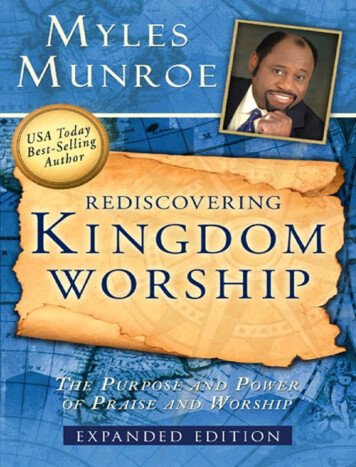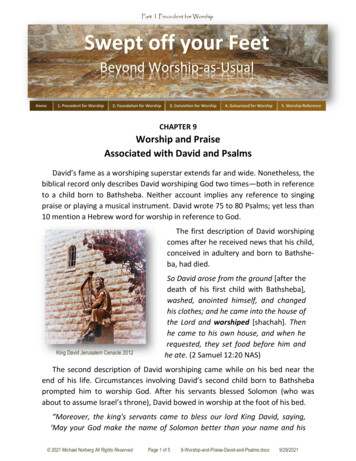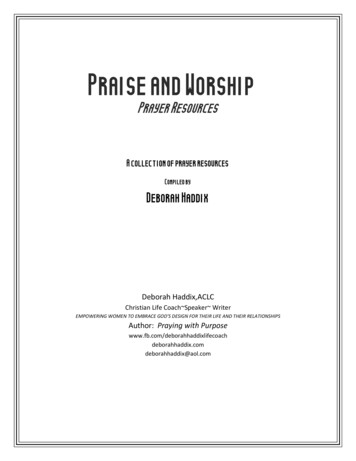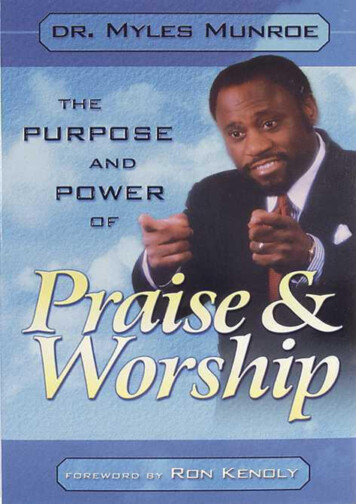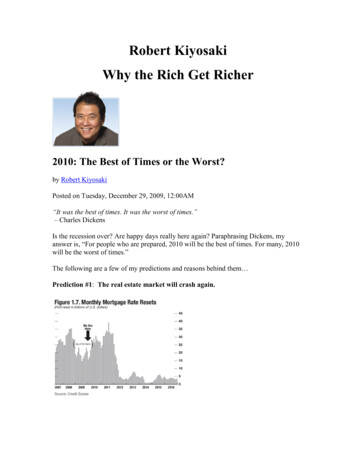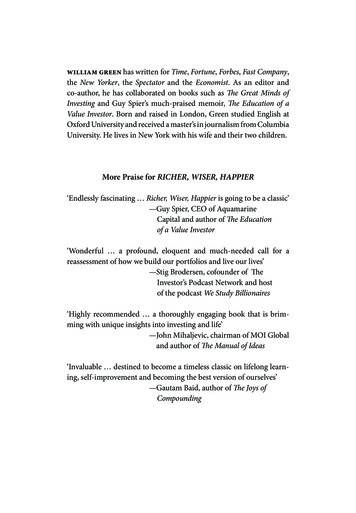
Transcription
william green has written for Time, Fortune, Forbes, Fast Company,the New Yorker, the Spectator and the Economist. As an editor andco-author, he has collaborated on books such as The Great Minds ofInvesting and Guy Spier’s much-praised memoir, The Education of aValue Investor. Born and raised in London, Green studied English atOxford University and received a master’s in journalism from ColumbiaUniversity. He lives in New York with his wife and their two children.More Praise for RICHER, WISER, HAPPIER‘Endlessly fascinating Richer, Wiser, Happier is going to be a classic’—Guy Spier, CEO of AquamarineCapital and author of The Educationof a Value Investor‘Wonderful a profound, eloquent and much-needed call for areassess ment of how we build our portfolios and live our lives’—Stig Brodersen, cofounder of TheInvestor’s Podcast Network and hostof the podcast We Study Billionaires‘Highly recommended a thoroughly engaging book that is brimming with unique insights into investing and life’— John Mihaljevic, chairman of MOI Globaland author of The Manual of Ideas‘Invaluable destined to become a timeless classic on lifelong learning, self-improvement and becoming the best version of ourselves’—Gautam Baid, author of The Joys ofCompoundingRicher, Wiser, Happier CS6.indd 123/02/2021 14:28
RI C HER,W I SE R,H AP PIERHOW THE WORLD’SGREATEST INVESTORSWIN IN MARKETS AND LIFEW I L L I A M GREENPROFILE BOOKSRicher, Wiser, Happier CS6.indd 317/02/2021 14:08
First published in Great Britain in 2021 byProfile Books Ltd29 Cloth FairLondonEC1A 7JQwww.profilebooks.co.ukFirst published in the US by Scribner, an imprint of Simon & Schuster, Inc.Copyright 2021 by William Green1 3 5 7 9 10 8 6 4 2Printed and bound in Great Britain byClays Ltd, Elcograf S.p.A.The moral right of the author has been asserted.All rights reserved. Without limiting the rights under copyright reserved above, no part of thispublication may be reproduced, stored or introduced into a retrieval system, or transmitted, inany form or by any means (electronic, mechanical, photocopying, recording or otherwise),without the prior written permission of both the copyright owner and the publisher of thisbook.A CIP catalogue record for this book is available from the British Library.ISBN 978 1 78125 860 6eISBN 978 1 78283 362 8Audio ISBN 978 1 78283 906 4Richer, Wiser, Happier CS6.indd 417/02/2021 14:08
ContentsIntroduction: Inside the Minds of the Greatest InvestorsixChapter One: The Man Who Cloned Warren BuffettHow to succeed by shamelessly borrowing other people’sbest ideas1Chapter Two: The Willingness to Be LonelyTo beat the market, you must be brave enough, independentenough, and strange enough to stray from the crowd31Chapter Three: Everything ChangesHow can we make smart decisions when nothing stays thesame and the future is unknowable? Ask Howard Marks55Chapter Four: The Resilient InvestorHow to build enduring wealth and survive the wildness thatlies in wait83Chapter Five: Simplicity Is the Ultimate SophisticationA long and winding search for the simplest path to stellarreturns109Chapter Six: Nick & Zak’s Excellent AdventureA radically unconventional investment partnership revealsthat the richest rewards go to those who resist the lure ofinstant gratification139viiRicher, Wiser, Happier CS6.indd 717/02/2021 14:08
CONTENTSChapter Seven: High-Performance HabitsThe best investors build an overwhelming competitiveadvantage by adopting habits whose benefits compoundover time169Chapter Eight: Don’t Be a FoolHow to invest better, think better, and live better by adoptingCharlie Munger’s strategy of systematically reducingstandard stupidities199Epilogue: Beyond RichMoney matters. But it’s not the essential ingredient of anabundant life229AcknowledgmentsNotes on Sources and Additional ResourcesIndex253257277viiiRicher, Wiser, Happier CS6.indd 817/02/2021 14:08
INTRODUCTIONInside the Minds ofthe Greatest InvestorsI’ve been obsessed with investing for a quarter of a century. At first, itseemed an unlikely passion. I had never taken a class in business oreconomics. I had no talent for numbers and no grasp of the esotericmysteries of accounting. After leaving Oxford with a degree in Englishliterature, I reviewed novels for magazines and wrote profiles of fraudsters and murderers. As an aspiring author with high-minded dreamsof literary fame, I found it easy to dismiss Wall Street as a casino fullof crass speculators who cared only about money. When the New YorkTimes landed on my doorstep, I would jettison the business sectionwithout even glancing at it.But in 1995, I found myself with a bit of cash to invest—my halfof the proceeds from the sale of an apartment that I owned with mybrother. I began to read incessantly about stocks and funds, eagerto increase my modest windfall. This reawakened in me a gamblingstreak that had briefly run wild when I was a teenager in England inthe 1980s. At fifteen, when I was a student at Eton, I’d sneak out ofschool on lazy summer afternoons and spend hours at a local “turfaccountant” near Windsor Castle, betting on horses while my classmates played cricket or went rowing. I was meant to become a poshEnglish gentleman like Boris Johnson, Prince William, and six centuries of Etonians before us. Instead, I had an illegal betting accountunder the name of Mike Smith.My interest in horse racing was fueled not by the romance of thesport or the majesty of the equine form, but by a desire to make moneywithout working. I took it seriously, jotting down elaborate notes abouthorses and courses, using multicolored ink pens to highlight my winsand losses. I ruined my sixteenth birthday by fighting with my parentsixRicher, Wiser, Happier CS6.indd 917/02/2021 14:08
INTRODUCTIONover their refusal to buy me a subscription to Timeform, a pricey system for rating horses. I was outraged that they blocked this obviousroute to untold riches. Shortly afterward, following a string of disillusioning losses, I renounced racing once and for all.A decade later, when I began to read about investing, I discovered that the stock market offered similar thrills. But the odds of success were much higher. Stocks struck me as the perfect way to cash inmerely by outthinking other people. Of course, I had no idea what I wasdoing. But I had one inestimable advantage. As a journalist, I couldindulge my new fixation by interviewing many of the best investors inthe business.In the years that followed, I interviewed a pantheon of investmentlegends for Forbes, Money, Fortune, and Time, returning again and againto the same overarching questions that fascinate me to this day: Whatprinciples, processes, insights, habits, and personality traits enable thistiny minority to beat the market in the long run and become spectacularly rich? More important, how can you and I profit by studying thesefinancial outliers and reverse engineering their winning ways? Thosequestions lie at the heart of this book.To my delight, many of the investors I encountered were fascinatingand oddly exotic. I flew to the Bahamas to spend a day with Sir JohnTempleton, the greatest global stock picker of the twentieth century,who lived in a Caribbean idyll called Lyford Cay. I traveled to Houston for an audience with Fayez Sarofim, an enigmatic Egyptian billionaire nicknamed the Sphinx. In his office, he displayed paintings byEl Greco and Willem de Kooning, along with a fifth-century mosaicfloor imported from a Syrian church. I spoke with Mark Mobius (theBald Eagle), who flew around the developing world in a Gulfstreamjet adorned with gold-plated fixtures and iguana-skin upholstery, purchased from a Middle Eastern tycoon who had fallen on hard times.I interviewed Michael Price, a polo-playing centimillionaire who terrorized underperforming CEOs and came to be known as “the scariestSOB on Wall Street.” I met Helmut Friedlaender, who had fled fromGermany in the 1930s, stopping only to pick up his teenage sister andbuy a hat “because a gentleman does not travel without a hat.” He drankChâteau Pétrus, collected precious medieval books, and traded everyxRicher, Wiser, Happier CS6.indd 1017/02/2021 14:08
INTRODUCTIONthing from coffee futures to the Empire State Building. In his nineties,he told me, “I have lived uproariously.”It was a priceless education. Jack Bogle, the index fund icon whofounded Vanguard, which now manages 6.2 trillion, talked to meabout the formative investment lessons he’d learned from his mentorand “hero,” a mutual fund pioneer named Walter Morgan: “Don’t getcarried away. Don’t take excessive risk. . . . Keep your costs low.” And:“The crowd is always wrong.” As we shall see, Bogle also explained why“you don’t need to be great” to thrive as an investor.Peter Lynch, Fidelity’s most famous fund manager, talked to meabout how he’d won by outworking everybody else. But he also spokeabout the wild unpredictability of markets and the need for humility: “You get a lot of A’s and B’s in school. In the stock market, youget a lot of F’s. And if you’re right six or seven times out of ten, you’revery good.” Lynch recalled one of his first failures: a high-flying apparelbusiness went bust “all because of the movie Bonnie and Clyde,” whichaltered women’s fashions so unexpectedly that the company’s inventory became “worthless.” Ned Johnson, the multibillionaire who builtFidelity into a behemoth, laughed and told Lynch, “You did everythingright. . . . Things come out of left field every now and then.”In the tumultuous days after 9/11, when financial markets were suffering their worst week since the Great Depression, I headed to Baltimore to visit Bill Miller, who was in the midst of an unprecedentedstreak of beating the S&P 500 index for fifteen years running. We spenta few days together and traveled in his Learjet, which he’d bought inpart so that his 110-pound Irish wolfhound could fly with him. Theeconomy was reeling, war was brewing in Afghanistan, and his fundhad tumbled 40 percent from its peak. But Miller was relaxed andcheerful, coolly staking hundreds of millions of dollars on beatendown stocks that subsequently soared.One morning, I was standing beside him when he rang his office tocheck in. The analyst on the other end of the line broke it to him thatAES, a stock that Miller had only just bought, had announced terribleearnings. The stock halved, costing him 50 million before lunchtime.Miller instantly doubled his bet, calmly assuming that irrational investors had overreacted to the company’s dismal news. As he explainedxiRicher, Wiser, Happier CS6.indd 1117/02/2021 14:08
INTRODUCTIONto me, investing is a constant process of calculating the odds: “It’s allprobabilities. There is no certainty.”And then there was Bill Ruane, one of the most successful stockpickers of his generation. When Warren Buffett closed his investment partnership in 1969, he recommended Ruane as a replacementfor himself. Until his death in 2005, Ruane’s Sequoia Fund generatedstunning returns. He almost never granted interviews, but we spoke atlength about the four guiding principles he had learned in the 1950sfrom “a major star” named Albert Hettinger. “Those simple rules havebeen of enormous importance to me,” said Ruane. “They formed thebasis for a large part of my philosophy ever since. . . . And they are thebest advice I can give people.”First, warned Ruane, “Do not borrow money to buy stocks.” Herecalled an early experience when, by using leverage, he “took six hundred dollars and multiplied it many times.” Then “the market cracked”and he was hit so hard that he sold out and was “back almost to squareone.” As he discovered then, “You don’t act rationally when you’re investing borrowed money.” Second, “Watch out for momentum.” That’s tosay, proceed with extreme caution “when you see markets going crazy,”either because the herd is panicking or charging into stocks at irrational valuations. Third, ignore market predictions: “I firmly believe thatnobody knows what the market will do. . . . The important thing is tofind an attractive idea and invest in a company that’s cheap.”For Ruane, the fourth principle was the most important of all: investin a small number of stocks that you’ve researched so intensively thatyou have an informational advantage. “I try to learn as much as I canabout seven or eight good ideas,” he said. “If you really find somethingvery cheap, why not put fifteen percent of your money in it?” For regular investors, there are safer paths to success. “Most people would bemuch better off with an index fund,” said Ruane. But for investors aiming to beat the market, concentration struck him as the smart way togo: “I don’t know anybody who can really do a good job investing in alot of stocks except Peter Lynch.”When we spoke in 2001, Ruane told me that 35 percent of Sequoia’sassets were riding on a single stock: Berkshire Hathaway. It had fallenout of favor during the dotcom craze, and Buffett, its chairman andxiiRicher, Wiser, Happier CS6.indd 1217/02/2021 14:08
INTRODUCTIONCEO, was lambasted for losing his touch. Yet Ruane saw what othersmissed: “a wonderful company” with superior growth prospects run by“the smartest guy in the country.”What I began to understand is that the greatest investors are intellectual mavericks. They’re not afraid to question and defy conventionalwisdom. They profit from the misperceptions and mistakes of peoplewho think less rationally, rigorously, and objectively. In fact, one of thebest reasons to study the investors spotlighted in this book is that theycan teach us not only how to become rich, but how to improve the waywe think and reach decisions.The rewards for investing intelligently are so extravagant that thebusiness attracts many brilliant minds. But there can also be a devastating price to pay for being wrong, which is rarely the case for professors,politicians, and pundits. The stakes involved may explain why the bestinvestors tend to be open-minded pragmatists who search relentlesslyfor ways to improve their thinking.This mindset is embodied by Buffett’s frighteningly clever partner,Charlie Munger, who once remarked, “I observe what works and whatdoesn’t and why.” Munger, who is one of the central figures in thisbook, has roamed far and wide in his quest for better ways to think,borrowing analytical tools from disciplines as diverse as mathematics,biology, and behavioral psychology. His role models include CharlesDarwin, Albert Einstein, Benjamin Franklin, and a nineteenth-centuryalgebraist named Carl Gustav Jacobi. “I learned a lot from a lot of deadpeople,” Munger told me. “I always realized that there were a lot ofdead people I ought to get to know.”I’ve come to think of the best investors as an idiosyncratic breed ofpractical philosophers. They aren’t trying to solve those abstruse puzzles that mesmerize many real philosophers, such as “Does this chairexist?” Rather, they are seekers of what the economist John MaynardKeynes called “worldly wisdom,” which they deploy to attack morepressing problems, such as “How can I make smart decisions about thefuture if the future is unknowable?” They look for advantages wherever they can find them: economic history, neuroscience, literature,Stoicism, Buddhism, sports, the science of habit formation, meditation, or anything else that can help. Their unconstrained willingnessxiiiRicher, Wiser, Happier CS6.indd 1317/02/2021 14:08
INTRODUCTIONto explore “what works” makes them powerful role models to study inour own pursuit of success, not only in markets but in every area of life.Another way to think about the most skillful investors is as consummate game players. It’s no coincidence that many top-notch moneymanagers play cards for pleasure and profit. Templeton used his pokerwinnings to help pay for college during the Depression. Buffett andMunger are passionate about bridge. Mario Gabelli, a billionaire fundmogul, told me how he earned money as a poor boy from the Bronxby playing cards between rounds as a caddy at a fancy golf club. “I waseleven or twelve,” he recalled, “and everybody thought they could win.”Lynch, who played poker in high school, college, and the army, toldme, “Learning to play poker or learning to play bridge, anything thatteaches you to play the probabilities . . . would be better than all thebooks on the stock market.”As I’ve come to realize, it’s helpful to view investing and life as gamesin which we must consciously and consistently seek to maximize ourodds of success. The rules are elusive and the outcome uncertain. Butthere are smart ways to play and dumb ways to play. Damon Runyon,who was besotted with games of chance, once wrote that “all life issix to five against.”* Perhaps. But what captivates me is that Templeton, Bogle, Ruane, Buffett, Munger, Miller, and other giants whom we’llstudy in the chapters to come have figured out shrewd ways to stack theodds in their favor. My mission is to show you how.Consider Ed Thorp, who is probably the greatest game playerin investment history. Before he became a hedge fund manager, heachieved immortality in gambling circles by devising an ingeniousscheme to beat the casino at blackjack. As Thorp explained to me over* One of Runyon’s greatest short stories is “The Idyll of Miss Sarah Brown,” whichinspired the musical Guys and Dolls. The hero, a high-rolling gambler nicknamed theSky, receives invaluable advice from his father about the perils of overconfidence—awarning that every investor would do well to internalize. “ ‘Son,’ the old guy says, ‘nomatter how far you travel, or how smart you get, always remember this: Some day,somewhere,’ he says, ‘a guy is going to come to you and show you a nice brand-newdeck of cards on which the seal is never broken, and this guy is going to offer to betyou that the jack of spades will jump out of this deck and squirt cider in your ear. But,son,’ the old guy says, ‘do not bet him, for as sure as you do you are going to get an earfull of cider.’ ”xivRicher, Wiser, Happier CS6.indd 1417/02/2021 14:08
INTRODUCTIONa three-hour breakfast of eggs Benedict and cappuccino, he refusedto accept the “conventional belief ” that it was mathematically impossible for players to gain an edge over the dealer. Thorp, the father ofcard counting, gave himself an advantage by calculating the changein probabilities once certain cards were “gone from the deck” and “nolonger available.” For example, a deck packed with aces offered himbetter odds than one without them. When the odds favored him, he betmore; when they favored the casino, he bet less. Over time, his modestadvantage became overwhelming. Thus, he transformed a loser’s gameof luck into a lucrative “game of math.”For his next trick, Thorp figured out how to beat the casino at roulette. He and a partner, Claude Shannon, created the first wearablecomputer, which Thorp activated furtively with a big toe inside hisshoe. The computer, which was the size of a cigarette pack, enabled himto “measure the position and velocity of the ball and rotor very accurately,” so he could predict where the ball was likely to land. For centuries, roulette was a mug’s game in which players had no edge, since theball has an equal chance of falling in each of thirty-eight pockets. “Butby adding some knowledge and some measurement, we get a little better grasp on the probabilities of what’s going to happen,” said Thorp.“You won’t get it right every time, but your forecast will be somewhatbetter than chance. . . . So we were turning what seemed like a game ofpure chance into a game where we had an edge. And the edge was provided by the information that we were adding.”Unless you own a casino, Thorp’s subversive genius is irresistiblyappealing. It was never the money that excited him so much as thejoy of solving “interesting problems” that all of the experts insistedwere insoluble. “Just because a lot of people say something is true, thatdoesn’t carry any particular weight with me,” said Thorp. “You need todo some independent thinking, especially about the important things,and try to work them out for yourself. Check the evidence. Check thebasis of conventional beliefs.”As Thorp’s adventures suggest, one critical way to improve our financial lives is to avoid games in which the odds are stacked against us. “Asfar as gambling is concerned, if I don’t have an edge, I don’t play,” saidThorp. Applying that same principle, the rest of us would be wise toxvRicher, Wiser, Happier CS6.indd 1517/02/2021 14:08
INTRODUCTIONface reality as honestly as possible; for example, if my knowledge oftechnology is flimsy or I lack the basic financial skills required to valuea business, I should resist any temptation to pick individual tech stocksfor myself. Otherwise, I’m like the patsy at the roulette wheel, hopingthat fate will smile kindly upon me despite my delusions. As JeffreyGundlach, a coldly rational billionaire who oversees about 140 billionin bonds, remarked to me, “Hope is not a method.”Another common mistake that tilts the odds against many unsuspecting investors is to pay lavish fees to mediocre fund managers,stockbrokers, and financial advisers whose performance doesn’t justify the expense. “If you’re paying tolls as you go and trading costs,advisory fees, all kinds of other charges, you’re swimming against thecurrent,” said Thorp. “If you’re not paying all these things, you’re swimming with the current.” One obvious way, then, for regular investors toboost their odds of long-term victory is to buy and hold index fundsthat charge minuscule fees: “You don’t have to do any work and you’reahead of maybe eighty percent of the people who do otherwise.” Anindex such as the S&P 500 will “probably” rise in the long run, addedThorp, driven by the “expansion of the American economy.” So, unlikegamblers in a casino, “you have an automatic edge” by merely participating in the market’s upward trajectory at a minimal cost.By contrast, Thorp’s hedge fund crushed the indexes over twodecades without a single losing quarter by focusing on more obscureinvestment opportunities that “were not well understood.” For example, his exceptional math skills enabled him to value warrants, options,and convertible bonds with unrivaled accuracy. Other key charactersin this book, such as Howard Marks and Joel Greenblatt, gained similaradvantages by specializing in neglected or detested niches of the financial markets. As we shall see, there are many ways to win, but they allrequire some form of edge. When I asked Thorp how to tell whetherI have one, he offered this disconcerting thought: “Unless you have arational reason to believe you have an edge, then you probably don’t.”When my investment journey began twenty-five years ago, I yearnedto be financially free and answerable to nobody. The best investors hadcracked the code, which seemed almost magical to me. But what I realize now is that understanding how these individuals think and whyxviRicher, Wiser, Happier CS6.indd 1617/02/2021 14:08
INTRODUCTIONthey win can help us immeasurably in so many ways—financially, professionally, and personally.For example, when I asked Thorp how to maximize my odds of ahappy and successful life, he illustrated his characteristic approach bydiscussing health and fitness. Thorp, who was eighty-four but lookedtwenty years younger, observed, “Genetically, you’re dealt certaincards. . . . You can think of that as chance. But you have choices abouthow to play those cards,” including the choice to avoid cigarettes, haveannual medical checkups, keep your vaccinations up-to-date, and exercise regularly. In his thirties, Thorp was “in terrible shape” and foundhimself “gasping for breath” after jogging for a quarter of a mile. So hestarted running one mile every Saturday, improving gradually until hecompleted twenty-one marathons. He still sees a personal trainer twicea week and walks three miles a day four times a week. But when someone suggested that he take up biking, Thorp scrutinized the number of“deaths per hundred million passenger miles for cycling” and “decidedthat the risk was too high.”When I spoke with him again, it was June 2020 and the world wasgripped by a pandemic that had already killed more than one hundredthousand Americans. Thorp explained how he’d analyzed the mortality data from around the globe, paying particular attention to “unexplained deaths” that were probably caused by the virus; how he’d drawn“inferences” from the 1918 flu pandemic that had killed his grand father; how he’d produced his own estimate of “the true fatality rate”;and how he’d predicted in early February (before a single death wasrecorded in the United States) that the country would lose two hundred thousand to five hundred thousand lives to this new coronavirusover the next twelve months.Thorp’s methodical analysis of the data enabled his family to taketimely precautions when few Americans—least of all, the nation’s leaders—recognized the magnitude of the threat. “We prudently putaway supplies of all kinds, including masks,” he said. “It was about amonth later that people woke up and started cleaning out store shelves.”Three weeks before the government declared a national emergency,Thorp placed himself in isolation at his home in Laguna Beach and“stopped seeing everybody” except his wife. “There’s no point beingxviiRicher, Wiser, Happier CS6.indd 1717/02/2021 14:08
INTRODUCTIONscared,” he told me. But he understood the risks and acted decisively toaugment his odds of survival. Thorp may be the only person I’ve evermet who actually calculated his own “chance of dying.”*That mental habit of thinking dispassionately about facts and figures, probabilities, trade-offs between risk and reward, and the paramount importance of simply avoiding catastrophe does much to explainhow the savviest investors live long and prosper. As Thorp sees it, everyaspect of our behavior should be guided by an attitude of “generalizedrationality.” For example, he knows that he’s more likely to make baddecisions when he’s “in emotional mode.” So, if he’s “irritated or mad”at somebody, he takes a step back and asks himself, “What do you reallyknow? Is your feeling justified or not?” His measured analysis oftenindicates to him that his adverse reaction was unwarranted. “We jumpto conclusions when we shouldn’t,” he observed. “And so withholdingjudgment is, I think, a key element of rational behavior.”All of this leads me to believe that the true titans of the investmentworld can help us to become richer, wiser, and happier. My goal is toshow you how they win both in markets and life by finding countlessways to optimize the odds of success.Playing the odds is an extraordinarily effective way to o perate,and it pervades everything they do, including how they managetheir time, how they construct a calm environment in which tothink, whom they hang out with and steer clear of, how they guardagainst biases and blind spots, how they learn from mistakes andavoid repeating them, how they handle stress and adversity, how theythink about honesty and integrity, how they spend money and giveit away, and how they attempt to build lives imbued with a meaningthat transcends money.In writing this book, I’ve drawn deeply from the most importantinterviews I conducted in the distant past with many of the world’s* How did Thorp estimate the odds that COVID-19 would kill him? “A randomeighty-seven-year-old male has about a twenty percent chance of dying if he gets thevirus,” he told me. “My risk is lower because a lot of eighty-seven-year-old males havesignificant other health problems, and I don’t. I have no comorbidity. I’m also supercareful. And I’m quite fit for my age. So, I figured my chance of being killed by it isbetween two and four percent. But that’s still plenty high.”xviiiRicher, Wiser, Happier CS6.indd 1817/02/2021 14:08
INTRODUCTIONbest investors. But I’ve also spent hundreds of hours interviewing morethan forty investors specifically for this book, reporting everywherefrom Los Angeles to London, Omaha to Mumbai. Between them, thecharacters you will meet here have overseen trillions of dollars onbehalf of millions of people. My hope is that these extraordinary investors will enlighten—and enrich—your life. I would bet on it.xixRicher, Wiser, Happier CS6.indd 1917/02/2021 14:08
Richer, Wiser, Happier CS6.indd 9 17/02/2021 14:08. x INTRODUCTION over their refusal to buy me a subscription to Timeform, a pricey sys-tem for rating horses. I was outraged that they blocked this obvious . had tumbled 40 percent from its peak. But Miller was relaxed and cheerful,

